wh---everl练习
名词性从句知识点+练习题

1.名词性从句是什么?分为?2.名词性从句考连接词的选择。
那么连接词有哪些?怎么用?连词/ 连接副词:连接代词:比较:连接副词、连接代词Can you tell me how I can get to the railway station?I will tell you what our school looks like.如何使用各个连接词?(which几乎不出现,which在名词性(主、宾、表)从句中的用法Which boy she likes best is still unknown/is still a mystery)whether,if 区别:主语从句中,句首只能用whether.主语从句后置时,与表示选择意义的or连用,只能用whether. It does not matter whether …or…it作形式主语,真正主语在后边时,if/whether均可宾语从句时一般可通用,但if不能与not连用:I don’t know whether he is coming or not.表语从句、同位语从句只能用whether. The problem is whether the meeting will be held.介词后只能用whether It depends on whether you can do the work well.有无ever的区分____leaves the room last ought to turn off the light.____will give us a talk is unknown to us all.3. 主语从句–e.g. That she will do well in her exam is certain.常用it作形式主语It is certain that she will do well in her exam.4.宾语从句:–e.g. Do you know that he has joined the army?that可以被省略。
高三英语一轮复习状语从句讲义以及练习题(高考总复习,纯干货,原创)
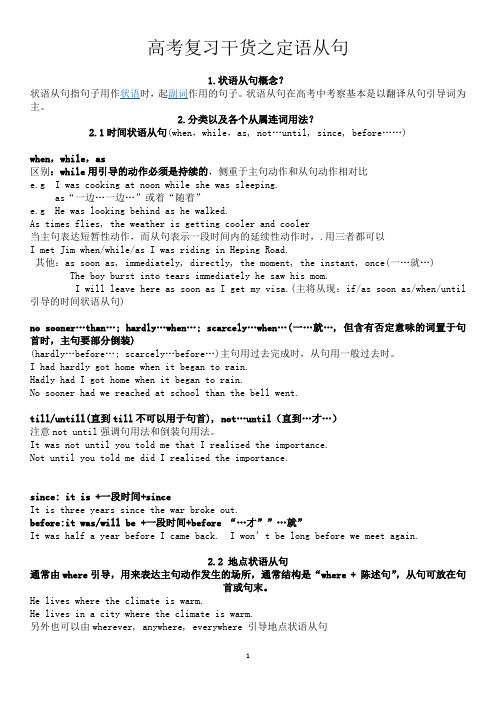
1.状语从句概念?状语从句指句子用作状语时,起副词作用的句子。
状语从句在高考中考察基本是以翻译从句引导词为主。
2.分类以及各个从属连词用法?2.1时间状语从句(when,while,as, no t…until, since,before……)when,while,as区别:while用引导的动作必须是持续的,侧重于主句动作和从句动作相对比e.g I was cooking at noon while she was sleeping.as“一边…一边…”或着“随着”e.g He was looking behind as he walked.As times flies, the weather is getting cooler and cooler当主句表达短暂性动作,而从句表示一段时间内的延续性动作时,.用三者都可以I met Jim when/while/as I was riding in Heping Road.其他:as soon as, immediately, directly, the moment, the instant, once(一…就…)The boy burst into tears immediately he saw his mom.I will leave here as soon as I get my visa.(主将从现:if/as soon as/when/until 引导的时间状语从句)no sooner…than…; hardly…when…; scarcely…when…(一…就…, 但含有否定意味的词置于句首时,主句要部分倒装)(hardly…before…; scarcely…before…)主句用过去完成时,从句用一般过去时。
I had hardly got home when it began to rain.Hadly had I got home when it began to rain.No sooner had we reached at school than the bell went.till/untill(直到till不可以用于句首), not…until(直到…才…)注意not until强调句用法和倒装句用法。
【英语】英语强调句练习题含答案及解析

【英语】英语强调句练习题含答案及解析一、初中英语强调句1. Yo.ar.waitin.a..wron.place.I.i.a.th.entranc. you.mothe.wil.mee.you......A. whereB. thatC. whichD. how【答案】 B【解析】【分析】句意: 你是在一个错误的地方等待。
你母亲会在入口接你。
分析句子可知, 本句强调地点状语at the entrance, 强调句型的结构为I t is +被强调部分+that+其它。
去掉It is …that…。
句子 at the entranceyour mother will meet you完整, 可知选B项。
【点评】考查强调句型, 掌握其结构:I t is +被强调部分+that+其它。
2. — It was ___________ who helped us out of danger.— What brave and helpful children! We should learn from them.A. theyB. themC. theirD. theirs【答案】 A【解析】【分析】根据题干, 这是一个强调句, 强调主语!英语中为了表达的正式, 这时应用主格的代词。
本句的意思是“就是他帮我们脱离的危险。
”所以本题选A。
【点评】对于强调句中强调主语时应注意, 如果不加分析可能会选择them。
这在平时的学习中一定要注意分析。
3. It'..lon.tim.ag._____s.time......A. whenB. sinceC. forD. that【答案】 D【解析】【分析】句意: 我上次见你是很久以前了。
强调结构It is…that…, 本句中it没有实际含义, 和is,that构成框架, 强调谓语以外的部分, 去掉它们句子仍然成立。
故选D。
【点评】本题考查的是强调句型结构。
强调句型是对句子的主语, 宾语, 状语等进行强调, (谓语除外), 其基本结构是It is +被强调的部分+that/who+句子的其他成分(强调主语若是人引导词可以用who/that,若是其他一律用that )。
高三状语从句考点和难点、对比练习和巩固提
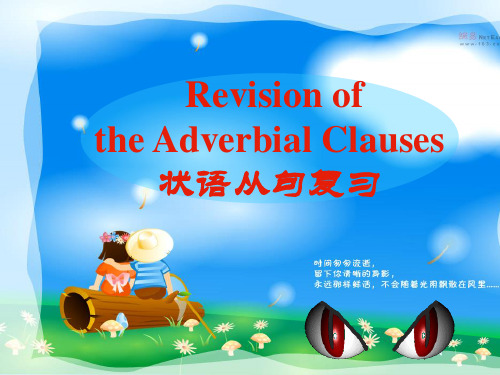
while 是高考中的高频词,它既可引导时间状语从句,又可 引导并列句,还可引导让步状语从句,表示“尽管”。 even if 等于 even though,表示“即使、尽管”。as though 等于 as if,引导方式状语从句,表示“好像、似 乎”。
问题2:
1、 He tried his best to solve the problem, ___ difficult it was. A
句型1.It will be/was…before… ―还要过多久才……‖ It will be two years before he leaves the country. 2.It will be/was not…before… ―不多久就…‖ It wasn’t two years before he left the country. 3)It is…since…
you won’t keep good health. (05重庆卷)
A. unless B. whenever C. although
A.as long as
B.while
C.if
D.even though
D. if
unless 相当于 if not,意思是“除非…”“如果不…就…”。这 也是高考的热点之一。复习时也应给予高度重视。
as long as 与 as far as 都可引导条件状语从句,as long as 表示“只要…”,as far as 表示“就…而论(而言)”。
题1根据题意应该选用B。in case 表示“以防”,根据题
2的句意,不难作出选择。
3、让步状语从句
问题1:
1、 _____ I accept that he is not perfect, I do actually like the A person. (04江苏) A. While B. Since C. Before D. Unless 2、Allow children the space to voice their opinions, ____they B are different from your own. (05湖南卷) A. until B. even if C. unless D. as though
wh- ever与_no_matter wh-用法归纳解析

1.Whoever breaks the law is to be punished. Anyone who breaks the law is to be punished. ______ ______ 2. He will give the dictionary to whoever needs it most.
• 4.Wh- + ever 与no matter + wh- 转换 • 两者的意思相同,而且两者都可以引导让步状语从句, 因此,引导让步状语从句时,两者可以相互转换。如: • 1)Whatever (= No matter what) you say, I won’t believe you.无论你说什么,我都不相信。 • 2)Whoever (= No matter who) you are, you have no right to do that. • 不管你是谁,你都没权那样做。 • 3)You can take it with you wherever (= no matter where) you go. • 无论你走到哪里,你都可以带着它。 • Notice: 当wh- + ever 引导主语从句、宾语从句时,不 可与no matter + wh- 转换。
2.wh- + ever 的语法功能:可引导主语从句、宾 语从句或状语从句,从句要用陈述语序;引导 状语从句要用一般时表将来。
• 1)Whoever leaves the room ought to turn off the lights. (Whoever = Anyone who ) • 无论谁最后离开教室都应该把灯关掉。 • 2)It is generally considered unwisБайду номын сангаас to give a child whatever he or she wants. • (whatever = anything that) 人们普遍认为,孩子要什么 就给什么是不明智的。 • 3)Go to stamp sales and buy whatever you can afford. (同2) • 到邮票销售点去,把能够买得起的邮票买下来。 • 4)Whomever you marry, make sure he can cook. • (作让步状语,Whomever = No matter whom) • 不管你跟谁结婚,他一定得会做饭才行。
音节划分口诀
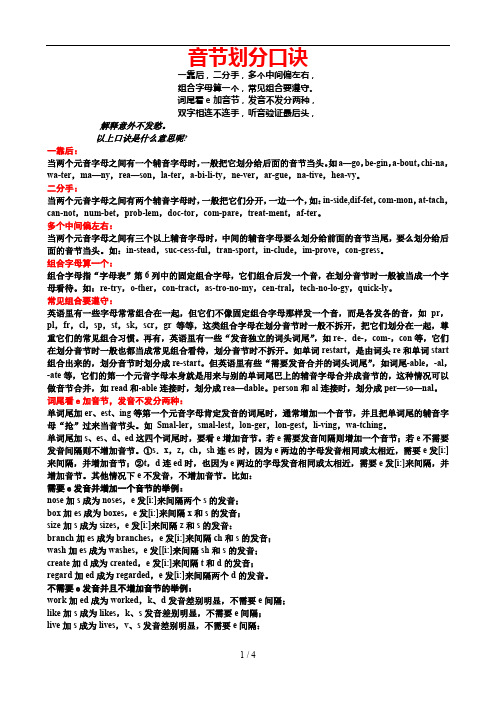
音节划分口诀一靠后,二分手,多个中间偏左右,组合字母算一个,常见组合要遵守。
词尾看e加音节,发音不发分两种,双字相连不连手,听音验证最后头,解释意外不发愁。
以上口诀是什么意思呢?一靠后:当两个元音字母之间有一个辅音字母时,一般把它划分给后面的音节当头。
如a—go,be-gin,a-bout,chi-na,wa-ter,ma—ny,rea—son,la-ter,a-bi-li-ty,ne-ver,ar-gue,na-tive,hea-vy。
二分手:当两个元音字母之间有两个辅音字母时,一般把它们分开,一边一个,如:in-side,dif-fet,com-mon,at-tach,can-not,num-bet,prob-lem,doc-tor,com-pare,treat-ment,af-ter。
多个中间偏左右:当两个元音字母之间有三个以上辅音字母时,中间的辅音字母要么划分给前面的音节当尾,要么划分给后面的音节当头。
如:in-stead,suc-cess-ful,tran-sport,in-clude,im-prove,con-gress。
组合字母算一个:组合字母指“字母表”第6列中的固定组合字母,它们组合后发一个音,在划分音节时一般被当成一个字母看待。
如:re-try,o-ther,con-tract,as-tro-no-my,cen-tral,tech-no-lo-gy,quick-ly。
常见组合要遵守:英语里有一些字母常常组合在一起,但它们不像固定组合字母那样发一个音,而是各发各的音,如pr,pl,fr,cl,sp,st,sk,scr,gr等等,这类组合字母在划分音节时一般不拆开,把它们划分在一起,尊重它们的常见组合习惯。
再有,英语里有一些“发音独立的词头词尾”,如re-.de-,com-,con等,它们在划分音节时一般也都当成常见组合看待,划分音节时不拆开。
如单词restart,是由词头re和单词start 组合出来的,划分音节时划分成re-start。
高三定语从句专练.
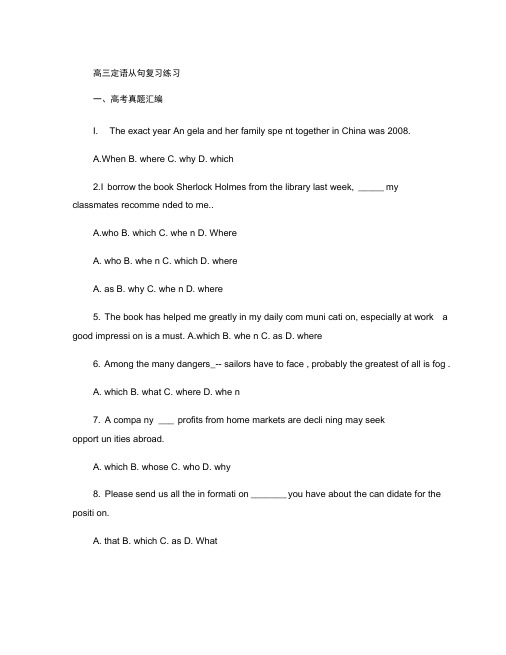
高三定语从句复习练习一、高考真题汇编I. The exact year An gela and her family spe nt together in China was 2008.A.WhenB. whereC. whyD. which2.I borrow the book Sherlock Holmes from the library last week, _____ my classmates recomme nded to me..A.whoB. whichC. whe nD. WhereA. whoB. whe nC. whichD. whereA. asB. whyC. whe nD. where5. The book has helped me greatly in my daily com muni cati on, especially at work a good impressi on is a must. A.which B. whe n C. as D. where6. Among the many dangers_-- sailors have to face , probably the greatest of all is fog .A. whichB. whatC. whereD. whe n7. A compa ny ___ profits from home markets are decli ning may seekopport un ities abroad.A. whichB. whoseC. whoD. why8. Please send us all the in formati on _______ you have about the can didate for the positi on.A. thatB. whichC. asD. What9. By serv ing others, a pers on focuses on some one other tha n himself or herself,____ can be very eye-ope ning and rewardi ng. A.who B.which C.what D.that10. Now, we have raised 50.000 pounds for the poor children, ____ is quiteun expected.A. thatB. whichC. whoD. it11. E nglish is a Ian guage shared by several diverse cultures, _______ u ses itdiffere ntly.A. all of whichB. each of whichC. all of themD. each of them12.1 d on t become a serious climber until the fifth grade, _____ I went up to rescuea kite that was stuck in the bran ches of a tree.A. whe nB. whereC. whichD. why13. We'll reach the sales targets in a month __ we set at at the begi nning of the year.A. whichB.whereC. WhenD.what14. Today , we ' ll discuss a number of cases ________ b eginners of English fail to use the Ian guage properly.A.whichB.asC.whyD.where15. Betwee n the two parts of the con cert is an in terval, _____ the audie nee canbuy ice-cream.A. whenB. whereC. thatD. which16. ___________________________________________ Whatever is left over may be put into the refrigerator, _______________________________ it will keep for two or three weeks.A. whenB. whichC. whereD. While17. ____________________________________ As a child, Jack studied in a village school, _____________________________________ is n amed after his gran dfather.A. whichB. WhereC. WhatD. that二、语法填空1. There isn ' t a moment ___________ I ' m not thinking of you.2. I hate the way ______ you n ever look at me whe n you speak to me.3. Thousands of Haitians cheered as the Chinese medical team arrived, many of_____ eve n cried with joy.4. She showed the visitors around the museum, the con structi on of ____ had take n more tha n three years.5. She has married aga in, _____ was un expected.6. The Beatles, ____ many of you are old eno ugh to remember, came from Liverpool.7. It is such a good place _____ everybody wants to go and visit ______ it is well known all over the world.8. The book was writte n in 1946, ______ (duri ng which/ since whe n the educati on system has wit nessed great cha nge.9. One of the boys who ______ (be my friends _______ (be very good at En glish.10. ______________________ Occasi ons are very rare I have the time to spe nd a whole day with my kids.11. I will put the book ______ you placed it and make a mark at the place _______I put it.12. It is on the morning of May first ______ I met Li Yang at the airport.三、对比练习1. ① This is one of the most in teresti ng films ___ show n last week.② This is the very one of the most in terest ing films ___ show n last week.A. which wasB. that wasC. which wereD. that were2. ① He has two sons, ____ are college stude nts.② He has two sons, and _____ a re college stude nts.A. both of whichB. both of whomC. both of themD. both of it3. ①_____ we all know, China is rich in n atural resources.②_____ is well-k nown that China is rich inn atural resources.③_____ is well-k nown, China is rich in n atural resources.A. WhichB. AsC. ItD. That4. ① I ' ll never forget the days _____ we studied together.② I ' ll never forget the days _____ we spent together.A. thatB.不填C. whenD. A and B5. ① This is the on ly way ____ y ou can find.② I don ' t like the way ______ h e spoke to his mother.A. thatB.不填C. in whichD. A, B and CE. A and B6. _____________________________ ① It was eleven o ' clock they went out of the cinema.② It was at eleveno ' clock ________ theywent out of emacinA. whichB. thatC. whenD. on which四、单句改错1. These who have ple nty of money will help their frie nd.2. This is the Iongest train which I have ever seen.3. Which we all know, swimming is a very good sport.4.1 shall n ever forget those years which I lived in the farm which you visited last week.5. The radio set which I bought it last week has gone wrong.6. He paid the boy $10 for washi ng ten win dows, most of them had n 'fot at least a year.7. The day will come which the people all over the world will win liberatio n.8. Mr. Herp in is one of the foreig n experts who is work ing in China.9. They talked for about an hour of thi ngs and pers ons who they remembered in the school.10. My glasses, with which I was like a blind man, fell to the ground and broke.五、语篇练习t bee n clea nedIn flue nza, or flu, is 1 ____ com mon in fecti on of the nose and throat, and sometimes the lungs. The cause is a virus that pa sses from one person to another. The virus spreads through the air 2 __________ an in fected pers on expels air sudde nly.Medical experts have ide ntified three major kinds of in flue nza. They call them type A, B and C. Type C is 3 ______ (little seri ous. People may not eve n know they have it. But researchers study the 4 ______ two kinds very closely. Viruses cha nge to sur vive. This can make 5 _____ difficult for the body to recog nize and fight an in fecti on.A pers on 6 _____ has suffered one kind of flu develops the same kind aga in. The body' s defense system produces antibodies. T hese substances stay in the blood and destroy the virus 7 ______ i t appears aga in. 8 ______ the body may not recog nize a fluvirus 9 _______ has eve n a small cha nge.Each year, researchers develop vacc ines to preve nt the spread of the flu virus. The WH O holds meet ings in 10 _____ experts discuss 11 _______ kinds of flu viruses to in clude in the n ext vacci ne.高三定语从句复习练习答案一、1-5DBDCD 6-10ABABB 11-15 BAADA 16-17CA二、 1.whe n 2. That/i n which 3. whom 4. which 5. which 6. which7. as ; that 8. since whe n 9. are;is 10. whe n11. where;where/i n which 12. that三、 1.①D②B2. ①B②C3. ①B②C③B4. ①C②D5. ①E②D 8.①D②A6. ①C②B四、l.these-those 2.which-that 3.which-as 4.which-whe n 5去掉it6. them-which7.which-when8.is-are9.who-that lO.with-without五、 1. a 2. when 3. least 4. other 5. it 6. who 7. when8. But 9. which/that 10. which 11. what高三定语从句复习练习答案一、1-5DBDCD 6-10ABABB 11-15 BAADA 16-17CA二、 1.whe n 2. That/i n which 3. whom 4. which 5. which 6. which7. as ; that 8. since whe n 9. are;is 10. whe n11. where;where/i n which 12. that三、 1.①D②B2. ①B②C3. ①B②C③B4. ①C②D5. ①E②D 8.①D②A6. ①C②B四、1.these-those 2.which-that 3.which-as 4.which-whe n 5去掉it6.them-which7.which-when8.is-are9.who-that lO.with-without五、1. a 2. when 3. least 4. other 5. it 6. who 7. when8. But 9. which/that 10. which 11. what。
小学英语名词单复数练习题带答案

小学英语名词单复数练习题带答案篇一:小学英语名词单复数练习题带答.英语专项测试名词复数(总分100分.一、请写出下列词的复数形式。
(1’*50=50’.thi.____________.watch__________.diary___________.day___________.book_______ ____.dress___________.sheep__________.tea____________.box_______ ___.strawberry_________peach_________.sandwich_________.pap er________. juice_________.water___________.milk__________.rice_________.二、单项选.(1’*10=10’.()1.Th._.i.ou.yar.ar.ver.beautiful.A.clothB.wate.C.flower.()2.To.i.on.o.th.Chines.____.i.ou.school.A.bo.B.boy.C.boie.()3..ca.ha.fou.___..doesn’.it.A.foot.B.fee.C.feet.()4.Ther.ar.thre.___.an.fiv.____.i.th.room.A.American.Japanes..Americans.Japanes.C.American.Japanes.()5.Ca.yo.se.nin.___.i.th.picture.A.fis.B.boo.C.hors.()6.Th.____.ha.two______.A.boy.watchB.boy.watche.C.boys.watc.()7.Th.____.ar.flyin.bac.t.thei.country.A.German.B.Germany.C.German.()8.Th.gir.brushe.he.____.ever.da.befor.sh.goe.t.bed.A.tooth.B.teethC.teeth.(.sa.man.____.i.th.street.A.people..’.(.gree.sweate.i.hi._________.’.三、选择填.(1’*10=10’)()1. .fro.differen._____.A.countr.B.countrie.C..countr.D.country.()2. Ho.man._____.d.yo.se.i.th.picture.A.tomato.B.tomatoe.C.tomatoD.th.tomat.()3. The.are______...woma.teachersB.wome.teacher.C.wome.teache.D.woma.teache.()4. Woul.yo.lik.______.,please.A.tw.glas.o. waterB.tw.glasse.o. wate.C.tw.glas.o. water.D.tw.glasse.o. water.()5. Mos.o._____.liv.i._______.A.Germans.Germa.B.German.Germe.C.Germen.German.D.Germans.German.()6. Ther.ar.som._____.i.thes._______.A.knifespencil-boxe.B.knivespencils-bo.C.knivespencil-bo.D.knivespencils-boxe.()7. _____.lik._____.b.air.A.Greens.travellingB.Th.Green.travelin.C.Th.Greens.travelD.Th.Greens.travelin.()8. .wonde.wh._____.ar.intereste.i.actio.films(武打片).A.th.peopleB.peopl.C.peoplesD.th.people.()9. Ther.i.n._____.i.th.plate.A.applesB.orangesC.riceD.egg.(.uncl.ha.thre._______.四.填入所给名词的正确形式(2’*10=20’.1. .hav.two___________.(knife.2. Ther.ar.man.__________.here.(box.3. Ther.ar.man.__________.o.th.road.(bus.4. .fe.__________.ar.drawin.o.th.wall.(boy.5.Th._____________.ar.playin.footbal.now.(child.6.Pleas.tak.tw.______________.fo.me.(photo.7..lik.th.re.________________.(tomato.8.Woul.yo.pleas.clea.you.____________.now.(tooth.9.D.yo.wan.som._________.(milk.10.Ther.ar.te.___________________i.ou.school.(woma.teacher)作.I.写出第三人称单数.wash________.matc._______guess_____.study_____.finish______ __.go_______.snow_____.carry________.II.用所给动词的适当形式填空.1.He_______.T.ever.evening.(watch.2.W.alway._______.t.schoo.o.foot.(go.3.Tom.wit.hi.classmates.ofte._____.footbal.afte.school.(pla y.4.You.shoe.______.unde.th.bed.(be.5._____.her.an._____.b.me.(come.stand.uall.________.t.wor.b.bus.(go.7..alway._____.u.a.si.i.th.morning.(get.8.Joh._______.lik.hi.father.(look.III.完成句.根据所给中文意思,在空白处填入适当词语完成句子。
高考英语状语从句和动词时态详解及练习
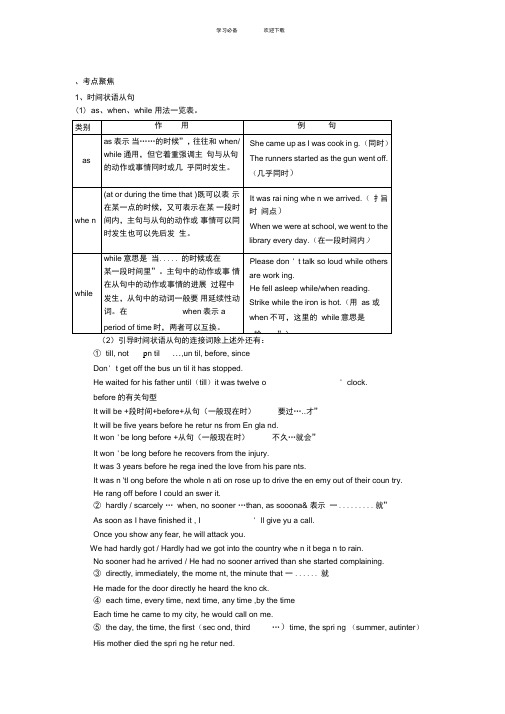
、考点聚焦1、时间状语从句(1) as、when、while 用法一览表。
(2)引导时间状语从句的连接词除上述外还有:①till, not p n til …,un til, before, sinceDon' t get off the bus un til it has stopped.He waited for his father until(till)it was twelve o ' clock.before的有关句型It will be +段时间+before+从句(一般现在时)要过…..才”It will be five years before he retur ns from En gla nd.It won 'be long before +从句(一般现在时)不久…就会”It won 'be long before he recovers from the injury.It was 3 years before he rega ined the love from his pare nts.It was n 'tl ong before the whole n ati on rose up to drive the en emy out of their coun try.He rang off before I could an swer it.②hardly / scarcely … when, no sooner …than, as sooona& 表示一......... 就”As soon as I have finished it , I ' ll give yu a call.Once you show any fear, he will attack you.We had hardly got / Hardly had we got into the country whe n it bega n to rain.No sooner had he arrived / He had no sooner arrived than she started complaining.③directly, immediately, the mome nt, the minute that 一...... 就He made for the door directly he heard the kno ck.④each time, every time, next time, any time ,by the timeEach time he came to my city, he would call on me.⑤the day, the time, the first(sec ond, third …)time, the spri ng (summer, autinter)His mother died the spri ng he retur ned.注意:表示未来情况,主句用将来时,从句用现在时。
英歌舞的基本功训练

英歌舞的基本功训练英文回答:Basic training in English song and dance is essential for performers to develop their skills and abilities. It lays the foundation for a strong technique and helps performers to excel in their performances. There are several key aspects of training that are important to focus on.Firstly, it is crucial to work on vocal technique. This includes exercises to improve breath control, vocal range, and clarity of diction. Singers need to develop a strong and flexible voice that can handle the demands of different musical styles. For example, practicing scales and arpeggios can help improve vocal agility and control.Secondly, dancers should focus on developing their physical strength and flexibility. This can be achieved through regular exercises such as stretching, strengthtraining, and conditioning. For instance, doing pliés, tendus, and grand battements can help improve leg strength and flexibility in ballet.Furthermore, performers should work on their acting skills to effectively convey emotions and tell a story through their performances. This involves studying and analyzing scripts, understanding character motivations, and practicing different acting techniques. For example, learning how to use body language and facial expressions to express different emotions can greatly enhance a performance.In addition, it is important to develop a sense of rhythm and musicality. This can be achieved through practicing various dance styles, such as jazz, tap, or hip-hop, which require precise timing and coordination. For instance, learning how to execute complex footwork in tap dance requires a strong sense of rhythm.Finally, performers should also focus on stage presence and presentation skills. This includes learning how toengage with the audience, project their voice, and maintain a confident and charismatic presence on stage. For example, practicing stage entrances and exits, as well as developing a strong stage presence through body language, can greatly enhance a performer's overall presentation.中文回答:英歌舞的基本功训练对于演员们发展自己的技巧和能力至关重要。
2021寒假作业高二英语 第06练 likely 和 wh-ever (解析版)
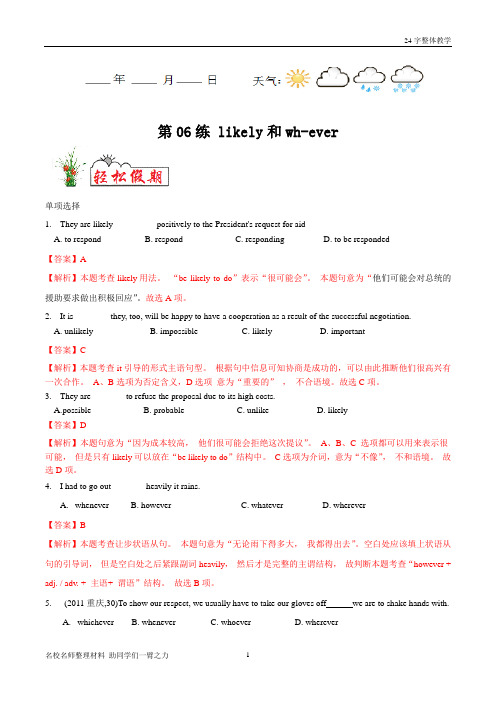
第06练 likely和wh-ever单项选择1.They are likely _________ positively to the President's request for aidA. to respondB. respondC. respondingD. to be responded【答案】A【解析】本题考查likely用法。
“be likely to do”表示“很可能会”。
本题句意为“他们可能会对总统的援助要求做出积极回应”。
故选A项。
2.It is ________they, too, will be happy to have a cooperation as a result of the successful negotiation.A. unlikelyB. impossibleC. likelyD. important【答案】C【解析】本题考查it引导的形式主语句型。
根据句中信息可知协商是成功的,可以由此推断他们很高兴有一次合作。
A、B选项为否定含义,D选项意为“重要的”,不合语境。
故选C项。
3.They are _______ to refuse the proposal due to its high costs.A.p ossibleB. probableC. unlikeD. likely【答案】D【解析】本题句意为“因为成本较高,他们很可能会拒绝这次提议”。
A、B、C 选项都可以用来表示很可能,但是只有likely可以放在“be likely to do”结构中。
C选项为介词,意为“不像”,不和语境。
故选D项。
4.I had to go out _______ heavily it rains.A.wheneverB. howeverC. whateverD. wherever【答案】B【解析】本题考查让步状语从句。
本题句意为“无论雨下得多大,我都得出去”。
wh词+ever-与no-matter-+wh词区分

高考英语疑问词+ever与no matter+疑问词不论是“疑问代词+ ever ”还是“疑问副词+ ever ”,其意义都是“不管/ 无论+ 该疑问词的本义”。
1. “疑问代词+ ever”可引导两种类型的从句,即让步状语从句和名词性从句(主语从句、宾语从句)。
(1)引导让步状语从句。
此时whatever / whoever / whichever 分别等于“ no matter + what / who / which”。
例如:Whatever happened,he wouldn't say a word. = No matter what happened,he wouldn't say a word.Whoever says so,it is wrong. = No matter who says so,it is wrong.Whichever dictionary you (may) take,you will have to pay at least 20 dollars. = No matter which dictionary you (may) take,you will have to pay at least 20 dollars.注意:这类从句中应用一般现在时表将来,从句中也常用情态动词may / might .(2)引导名词性从句。
例如:Whoever smokes here will be punished. (主语从句)Beggars will eat whatever they are given. (宾语从句)Whichever he likes will be given to him. (主语从句)You may invite whoever / whomever you like. (常用whoever 代替whomever)此时它们都不能换成“ no matter + 疑问词”的形式,但whoever 等于anyone who,whatever 等于anything that•. “疑问副词+ever ”:wherever / whenever / however 一般只能引导一种类型的从句,即让步状语从句,此时它们分别等于“ no matter + where / when / how ”。
wh的发音规则记忆口诀
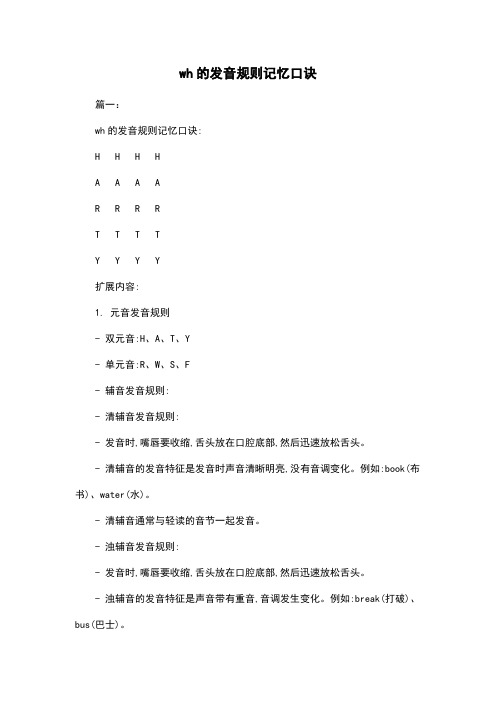
wh的发音规则记忆口诀篇一:wh的发音规则记忆口诀:H H H HA A A AR R R RT T T TY Y Y Y扩展内容:1. 元音发音规则- 双元音:H、A、T、Y- 单元音:R、W、S、F- 辅音发音规则:- 清辅音发音规则:- 发音时,嘴唇要收缩,舌头放在口腔底部,然后迅速放松舌头。
- 清辅音的发音特征是发音时声音清晰明亮,没有音调变化。
例如:book(布书)、water(水)。
- 清辅音通常与轻读的音节一起发音。
- 浊辅音发音规则:- 发音时,嘴唇要收缩,舌头放在口腔底部,然后迅速放松舌头。
- 浊辅音的发音特征是声音带有重音,音调发生变化。
例如:break(打破)、bus(巴士)。
- 浊辅音通常与重读的音节一起发音。
- 双元音和单元音的区别:- 双元音发音时,两个元音发音时间隔较短,例如:hello(嘿啦)、thank you(谢谢)。
- 单元音发音时,只有一个元音发音,例如:cat(猫)、read(读)。
2. 辅音发音规则- 清辅音发音规则:- 发音时,嘴唇要收缩,舌头放在口腔底部,然后迅速放松舌头。
- 清辅音的发音特征是声音清晰明亮,没有音调变化。
例如:book(布书)、water(水)。
- 清辅音通常与轻读的音节一起发音。
- 浊辅音发音规则:- 发音时,嘴唇要收缩,舌头放在口腔底部,然后迅速放松舌头。
- 浊辅音的发音特征是声音带有重音,音调发生变化。
例如:break(打破)、bus(巴士)。
- 浊辅音通常与重读的音节一起发音。
- 双元音和单元音的区别:- 双元音发音时,两个元音发音时间隔较短,例如:hello(嘿啦)、thank you(谢谢)。
- 单元音发音时,只有一个元音发音,例如:cat(猫)、read(读)。
3. 单词练习- 练习:hello- 发音:嘿啦- 练习:thank you- 发音:谢谢篇二:wh的发音规则记忆口诀:1. "H"永远发音为"h",不像"f"和"v"那样变化2. "W"发音为"w",与"v"发音相似3. "H"与"W"发音时,嘴巴要张开4. "F"和"V"的发音规则与"H"和"W"类似,只是嘴巴要更张开5. "T"和"D"的发音规则与"H"和"W"类似,只是嘴巴要更张开6. "E"和"I"的发音规则与"H"和"W"类似,只是嘴巴要更张开拓展:除了上述口诀,还有一些其他的发音规则可以帮助记忆英语单词中的" wh"音。
wh-+ever与_no_matter+wh-用法归纳
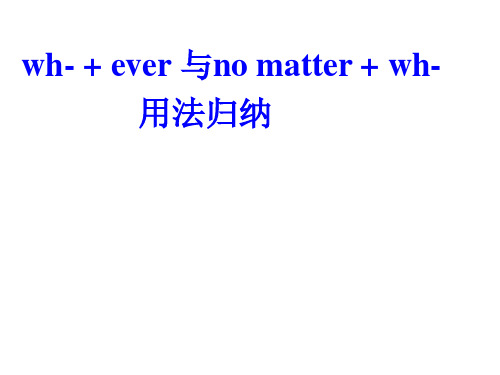
Whatever和no matter what 区别: I’ll believe it,no matter what he says. I’ll believe whatever he says. who和whoever的区别: _____ wants a computer may have one. A.Who B. Whoever
_____difficulties we may come across, we'll help one another to overcome them. A. Wherever B.Whatever C.However D.Whenever
1.Whoever breaks the law is to be punished. Anyone who ______ ______ breaks the law is to be punished. 2. He will give the dictionary to whoever needs it most.
1. ________ team wins on Saturday will go through to the national championships. A. No matter what B. No matter which C. Whatever D. Whichever 2. ________we gave him something to eat, he would save it up for his little sister. A.Whatever B. However C. Whenever D. Whichever 3. Doctor Godwin says that______what forceful arguments against cigarettes there are, many people insist on smoking. A. though B. however C. no matter D. even if
语音练习手册
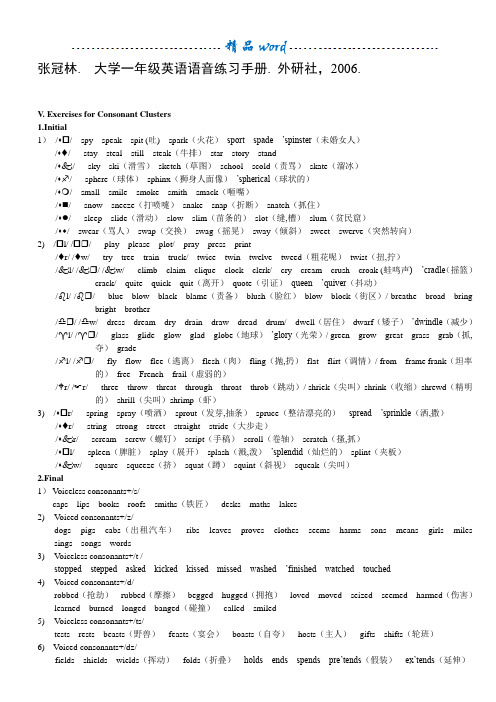
张冠林. 大学一年级英语语音练习手册. 外研社,2006.V. Exercises for Consonant Clusters1.Initial1)/♦☐/ spy speak spit (吐) spark(火花)sport spade ’spinster(未婚女人)/♦♦/ stay steal still steak(牛排)star story stand/♦/ sky ski(滑雪)sketch(草图)school scold(责骂)skate(溜冰)/♦♐/ sphere(球体)sphinx(狮身人面像)’spherical(球状的)/♦❍/ small smile smoke smith smack(咂嘴)/♦⏹/ snow sneeze(打喷嚏)snake snap(折断)snatch(抓住)/♦●/ sleep slide(滑动)slow slim(苗条的)slot(缝,槽)slum(贫民窟)/♦♦/ swear(骂人)swap(交换)swag(摇晃)sway(倾斜)sweet swerve(突然转向)2) /☐l/ /☐❒/ play please plot/ pray press print/♦r/ /♦w/ try tree train truck/ twice twin twelve tweed(粗花呢)twist(扭,拧)/ l/ / ❒/ / w/ climb claim clique clock clerk/ cry cream crush croak (蛙鸣声) ’cradle(摇篮)crack/ quite quick quit(离开)quote(引证)queen ’quiver(抖动)/♌l/ /♌❒/ blue blow black blame(责备)blush(脸红)blow block(街区)/ breathe broad bring bright brother/♎❒/ /♎w/ dress dream dry drain draw dread drum/ dwell(居住)dwarf(矮子)’dwindle(减少)/♈l/ /♈❒/ glass glide glow glad globe(地球)’glory(光荣)/ green grow great grass grab(抓,夺)grade/♐l/ /♐❒/ fly flow flee(逃离)flesh(肉)fling(抛,扔)flat flirt(调情)/ from frame frank(坦率的)free French frail(虚弱的)/ r/ /☞r/ three throw threat through throat throb(跳动)/ shriek(尖叫)shrink(收缩)shrewd(精明的)shrill(尖叫)shrimp(虾)3) /♦☐r/ spring spray(喷洒)sprout(发芽,抽条)spruce(整洁漂亮的)spread ’sprinkle(洒,撒)/♦♦r/ string strong street straight stride(大步走)/♦r/ scream screw(螺钉)script(手稿)scroll(卷轴)scratch(搔,抓)/♦☐l/ spleen(脾脏)splay(展开)splash(溅,泼)’splendid(灿烂的)splint(夹板)/♦w/ square squeeze(挤)squat(蹲)squint(斜视)squeak(尖叫)2.Final1)V oiceless consonants+/s/caps lips books roofs smiths(铁匠)desks maths lakes2)V oiced consonants+/z/dogs pigs cabs(出租汽车)ribs leaves proves clothes seems harms sons means girls miles sings songs words3)V oiceless consonants+/t /stopped stepped asked kicked kissed missed washed ’finished watched touched4)V oiced consonants+/d/robbed(抢劫)rubbed(摩擦)begged hugged(拥抱)loved moved seized seemed harmed(伤害)learned burned longed banged(碰撞)called smiled5)V oiceless consonants+/ts/tests rests beasts(野兽)feasts(宴会)boasts(自夸)hosts(主人)gifts shifts(轮班)6) V oiced consonants+/dz/fields shields wields(挥动)folds(折叠)holds ends spends pre’tends(假装)ex’tends(延伸)VI.Exercises for Incomplete Plosion , Nasal and Lateral Plosion1.incomplete plosion1)Plosives + plosives`active `blackboard `bookcase `post-card Sep`tember`put `down / `wet `ground / `next `door / `stop `talking / `keep `quiet / `take `care / ` not `bad / `great `concern / `hard `times / `quite `different/ `waste/`time / a `great deal2)Plosives +Fricatives(1)`friendship `first / `old `friends / `step `forward(向前走)/ `red `flags / a bright `future(光明的前程) / `sweet `flowers /`ripe fruit / a com`plete `failure(彻底的失败)/ ad`vance/ ad`vice / a `kind `voice / a `one-sided `view(片面的观点) / `first `visit/ `second `volume (第二卷) / `constant `vigilance(始终警惕) / a com`plete `victory(2)`just `think / a `thousand `thanks(万分感谢) / `get `through(通过) / `take `three/ `bright `thought / the `right `thing /`abstract `theory(抽象的理论) / `black `thread / `get `there / `just `then / `take `this / `ask them(3)`red `stars / `bright `sky / `first `step(第一步) / `keep `silent(保持安静) / `short `stories / `folk `songs(民歌) / `deep`snow / a `great suc`cess / a `good `season/ a `big `zoo / a `good `zipper(一条好的拉链)(4)`bookshelves / `first `shift(第一班)/ `don’t `shout / `look `sharp / `make `sure(确保)/ a `good `shot (一个好球)/ a`smart shirt (一件漂亮的衬衣) / a `public`show(公演)3)Plosives+Affricates`white`chalk / `great`changes/ `loud`cheers(大声欢呼)/ a`good`try/ a`good`child/ the`first`chapter(第一章)/ a`bit`dry / a`second`choice / a`good`job/ a`black`jacket/ a`big`tree/a`big`jar/ a`hard`journey/ `excellent`judgement(精辟的判断)/ a`fast`train/ a`sweet`dream/ a`cold`drink2.Nasal Plosion/♦,♎+❍,⏹/ good`morning/ at`tend`meetings/ `not`mine/ `help me/ a`good`memory(好记忆)/ a`different`meaning/ an im`portant`matter/ `midnight(午夜)/ at`noon/ `not`now/ `don’t`know/ `odd`numbers(单数)/ `quite`near/ `good`news/ `urgent`needs/ a`loud`noiseteral Plosion/♦,♎+●/ `little `battle(战斗) ` bottle `cattle(牲口) `gentle(文雅的) `kettle(水壶) `settle `title(头衔)` bundle(包,捆) `candle(蜡烛) `handle(把手) `idle(懒散的) ` middle `paddle(涉水) `needle`boldly(大胆地) `friengly `hardly `loudly `proudly `rapidly at`least/ at`last/ at`leisure(闲着的)/ at`lunch/ at`liberty(自由的)An`outline(大纲)/ a`red`lantern(红灯笼)/ the`third`lesion/ a`good`leader/ the`second`longest(第二长)Ⅶ.Exercises for ImportantWeak Formsa,an /☜, ☜⏹ /a `lion/ a `table / an ungly `man / an `hour / an `honest `man / aEuro`pean / a uni`versity / `what a pity! / You’ll `need an axe. / An `apple a `day `keeps the `doctor away.(每日一苹果,不必看医生)am/ ☜❍, ❍ /I’m `all right. / I’m `not `ready yet. / I’ve seen him and am `glad to`say he’s well. / `What am I to do? / I’m in a `terrib le hurry.(我急着要[走])/`Where am I now?and/ ☜⏹d, ☜⏹/`Two and `six / `fire and the `sword / `Tom and `Annie / `John and`Kate left early. / `Give `Jack `four and a penny. / `Go and `tell yourUncle. / a `cat and `dog life (充满争吵的生活)are/ ☜ /The `boys are here. / Our `friends are out. / Are you there? / `What are you doing?/ These `things are `all mine./ Are you ready to go now?as/☜/as good as gold ([小孩]很乖)/ as far as I know(就我所知)/It look as if you`re right./ Do as you`re told. It isn`t as good as I thought./ I`ll stop now, as it`s late .at/☜♦/I`m looking at the clock./ Tom`s still at school./He`ll be back at six./I`ll meet you at the gate./You`ll see a bank at the corner./At any rate, that`s not bad!be/♌✋/Don`t be late./ Do be quiet./I`ll be ready soon./Come on, I don`t want to be late!/We shall be there in plenty of time. been/♌✋⏹/You`ve been a long time./ All the work`s been done./I`ve been cheated!/We`ve been playing chess./I wish I hadn`t been so hasty.(如果我不是那样草率就好了)but/♌☜♦/It`s old but useful./We`ve nothing but water./ It`s raining but I`ll o out./ Jack`s careful but not very bright.( Jack很认真但不聪明)/ That`s nothing but nonsense.can/ ☜⏹/`What can I `do to help you?/ I can `see it `quite well./I can `smell gas./ `That can be `done in a minute./ Can you `do me a favor?(能帮我个忙吗?)could/ ☜♎/I could `leave early./ `What could I do ?/The `dress could be altered.(衣服可以改)/I `wish I could swim./You could `do it if you tried./We could `put you `up for the night.(我们可以让你过夜)do/♎☜,♎/`What do you want?/ `Where do you buy them?/ Where do you get them?/Do you `really `think he is stupid?/ `Why do you `work so hard?does /♎☜/`What does he do for a living? (他靠什么生活)/ `Where does `this `road lead to?(这条路通到哪里)/`Where does your `brother live?/`How does that affect you? (那件事对你影响如何)/ `How on `earth does it work?for/♐☜/Is `this for me? / `This `watch will `last forever!/ There`s `parcel here for you./`This`ll be good for you.(这对你有好处)/For `years and `years I`ve `said it would happen .(多少年来我一直在说这事会发生)/It was `art for art`s sake.(那是为了艺术的艺术)from/♐❒☜❍/I `can`t tell `one from the other./ I`ve `just `heard from Mary./He`s a `visitor from Italy./He `can`t tell `red from green.(他不能区分红绿二色)had has have /♒☜♎,♎/ /♒☜, / /♒☜❖,❖/Has the `post come?(邮件来了吗)/Had I know, I`d have told you about it./ When `Tom had finished, he left./`Cook has `burned the cakes./ The `guests have arrived./ They`d gone./ We`d `better hurry./ You`ve `made a mistake./ That`s `never oc`curred before./Has your `friend `got `over the incident?(你朋友已经摆脱事故的影响了吗)he/♒✋,✋/He `told me a story./ `What was it he said?/ He`s a `good boy./ He`s `gone be`fore I arrived.her /♒☜,☜/I `gave her a book./ She`s `got her ticket./ Her `answer sur`prised her father./ They `gave her a `lot of `good advice. him /✋❍/I `gave him a book./ `Give him my `best wishes./ `Tell him to come./ I met him once./ I `don`t know him and I don`t want to know him.is/ ,♦/`Who`s in the bathroom?/ `What`s the matter?/ The `man`s in the kitchen./ His `wife`s Italian./ `What`s the use of grumbling?(抱怨有什么用处) /That `fellow`s a scoundrel.(那个人是个坏蛋)me /❍✋/He `gave me my ticket./ They `want me to do it./ `Bill `taught me to swim./ `Don`t `look at me like that, is `makes me nervous .must /❍☜♦♦/You must `eat it at once./ He must `go now./ You must re`member you`re `only a beginner./ I must `make a note of that.(我得把这事记下来)/ `That must be done at once.of /☜❖/`One of the `books is missing./ It`s `made of `cheese and eggs./ The `jug is `full of cream./ I`ve `never heard of it./ `That `one`s the `best of the bunch.(那人是这些人中最好的)shall /☞☜l/`When shall I see you again?/ I shall be `back soon./ Shall I `see you home?/ `What shall we tell him when we see him?/ I shall be `thirty `next `Wednesday.(下个星期我就30岁了)she /☞✋/`What did she say?/ She `said she was in a hurry./ She `told me she `hadn`t time./ She `doesn`t like plums, doesn`t she? should /☞☜d/What should I say?/ We should `get there `early by `that train./ You should be careful, my boy./ I should be `much obliged to you.(我非常感谢你)/ `Everyone should `try to do good.(大家都应该做好事)some /♦☜❍,♦❍/Would you `like some milk?/ I`ve got some letters for you ./ `Give him some more./ Have you `got some `good coffee?/ He `bought some eggs, some bacon and some bread.than /❆☜⏹/It`s `bigger than I thought./ `That`s `more than I want./ `That`s `more than enough./ `Don`t `eat `more than your share.(别吃得过量)that/❆☜♦/He `said that he was late./ I `told him that he was lazy./ Well, `this is the `best that I can do.them /❆☜m/I`ll `give them back./ We `saw them yesterday./ `Please `hand these pens to them./ `Give then my regards.(代我向他们问好)/ `If I see them, I`ll `tell then what happened.there /❆☜/There`s a `club a`round the corner.(拐弯处有个俱乐部)/ `Is there a can`teen here?(这儿有吃饭的地方吗)/ There was a `strange l`ook in his eyes.(他眼中流露出一种奇异的神情)/ `Oh dear, there isn`t `any `bread left.to /♦☺,♦☜/I `want you to `work hard./ They `went to the zoo./ Do you `want to go? `Oh, yes, I`d love to./ `Last `year they `went to India.us/☜♦/They `told us to go./ I `wonder if they saw us./ `Let`s `go out now./ They `gave us a `cordial welcome.(他们热情欢迎我们)was /♦☜s/`What was he saying?/ Was` anyone hurt?(有人受伤了吗)/ `That was splendid./ He `said his `friend was an artist./ `What was his `expla`nation?we /♦✋/We `saw him there, didn`t we?/ `What shall we do?/ We`ll `go tomorrow./ We`d `like a drink./ We`ve `not `much time./ `Why are we waiting?were /♦☜/The `boys were busy./ They were `all at home./ `What were you doing?/ There were `several foreigners here./ `Why were you so angry with him?would /♦☜♎,♎/`What would you like?/ `What would be the `best thing to do?/ `John would help you if you asked him./I`d do it if I could./ We`d `love to go./ You`d succeed if you tried.(只要坚持你就会成功)VIII.Reading Materials for the Practice of Pausing1`Unlike the aeroplane,/ `helicopter can `fly `straight `up and down.// It can `hover and a`light on the ground / as `gently as a `bird `settles in a tree.// An `aeroplane `travels `very fast / `even when it is `coming down ,/ so it `needs a very large `field to `land in.// A` helicopter `cannot `carry as `many passengers,/ but it can `land in a `very `small space.// It can `even `land safely on the `flat `roofs of buildings.2The `year has `four seasons :/spring,/ summer,/ autumn and winter.// There are `twelve months:/January,/ February,/ March,/ April,/ May,/ June,/ July,/ August,/ September,/ October,/ November and December.A `month has `thirty or thirty-`one days.// `February has `twenty-eight days,/ and twenty-`nine in a leap year.// A `week has seven days:/ Monday,/ Tuesday, / Wednesday, / Thursday , / Friday / Saturday and Sunday .The `day has `twenty-`four hours, / an hour `sixty minutes / and a minute `sixty seconds.3An `airport is a `very `busy place,// Be`sides the `long `runways `needed by planes / when `coming `in to land or when `taking off, /there are `many im`portant buildings on it.// These are `all `near one another , / and the `most im`portant `one is the con`trol tower, / from `which `signals by `wireless are made / to ar`riving and de`parting planes.// There are `also hangars / where `planes are `kept un`til they are needed / and where they can be `overhauled and repaired, / `waiting room for passengers, / `customs offices,/ restaurants, / and `very `often a hotel.// If the `airport is some `distance from a town or a `railway station, / `buses may be `provided for the con`venience of passengers.New Wordsaeroplane /`♏☜❒☜☐●♏✋⏹ /n. 飞机helicopter /`♒●✋ɒ☐♦☯/ n . 直升飞机straight /♦♦❒♏✋♦/ ad. 直接地hover /`♒ɒ❖☯/ v. 盘旋alight /☜`●♋✋♦/ v. 降落gently /`♎✞♏⏹♦●✋/ ad. 轻轻地settle /`♦♏♦●/ v. 飞抵,飞下passenger /`☐✌♦☜⏹♎✞☜/ n. 乘客space /♦☐♏✋♦/ n. 空间roof /❒✞♐/ n. 房顶leap year闰年airport /`♏☯☐♦/ n. 飞机场runway /`❒✈⏹♦♏✋/ n. 跑道land /●✌⏹♎/ v. 着陆take off 起飞control tower控制塔signal /`♦✋♈⏹☜●/ n. 信号wireless /`♦♋✋☜●✋♦/ n. 无线电arriving and departing planes抵达机场的或离开hangar /`♒✌☠☜/ n. 飞机库起飞的飞机overhaul /`☜☺❖☜♒●/ v. 大检修repair /❒✋`☐♏☜/ v. 修理customs offices海关hotel /♒☜☺`♦♏●/ n. 旅馆distance /`♎✋♦♦☯⏹♦/ n. 距离provide /☐❒☜`❖♋✋♎/ v. 提供convenience / ☯⏹`❖♓⏹☯⏹♦/ n.方便Exercises Mark the places where pauses should be made:1Much of the paper we use is made from trees. Woodsmen go into the forest and cut down the trees. Other men cut the trees into logs which are taken to the paper mill. There large saws cut the logs into very small pieces about sixteen inches long. These are then cut into very small pieces by many sharp knives. Now large vats which look like big flat barrels receive the small pieces. In these vats the pieces are made into what is called pulp. This pulp is laid on copper nets and runbetween heavy hot rollers that press it into paper. At last, after going between many rollers,much of the paper is wound into rolls and placed in a storehouse ready to be used.woodsman /`♦☺♎❍☜⏹/ n. 伐木工forest /`♐ɒ❒✋♦♦/ n. 森林log /●ɒ♈/ n. 圆木saw /♦/ n. 锯子inch /✋⏹♦☞/ n. 英寸vat /❖✌♦/ n. 大桶barrel /`♌✌❒☜●/ n. 圆桶pulp /☐✈●☐/ n. 纸浆copper /` ɒ☐☜/ n. 铜net /⏹♏♦/ n. 网状物roller /`❒☜☺●☜/ n. 滚筒press /☐❒♏♦/ n. 挤,压wound /♦♋☺⏹♎/ v. 弯曲(动词wind的过去分词)storehouse /`♦♦♒♋☺♦/ n. 仓库2Have you ever seen a forest fire?It is a terrifying thing to see the flames run along the ground licking up the leaves and dead branches.No wonder those whose homes are near gather quickly to fight the fire.If the fire cannot be stopped,these people will lose everything .water can seldom be used to put out a forest fire for most of the time water is not available.Instead of using water the men fight fire with fire.With hoes,shovels,and rakes they make a broad,chean path through the forest some distance ahead of the fire.Then they set “backfires”along that side of this clean path which lies toward the coming fire.These backfires burn slowly toward the main fire.when they meet both must die out for lack of fuel.flame /♐●♏✋❍/ n. 火焰lick /●✋// v. (火焰等)掠过,吞没branch /♌❒⏹♦☞/ n. 树枝put out扑灭available /☜`❖♏✋●☜♌●/ a. 可以得到的,在手边的hoe /♒☜☺/ n. 锄头shovel /`☞✈❖☜●/ n. 铲子rake /❒♏✋/ n. 耙子backfire / `♌✌♐♋✋☜/ n. 回火(以火灭火)fuel /♐✞☜●/ n. 燃料3Most of us like to eat potatoes.But most people do not know what part of the potato is best for food.Take a sharp knife and cut from the middle of the potato a slice as thin as paper.Hold the slice between your eyes and the light.You will see that the potato has a skin,an outside rim,and an inside part.The outside rim which is immediately beneath the away with the skin.Even the skin itself is better for food than the inside.When eating a baked potato,if you scoop out the inside and leave the outside you are wasting the best part of it.If you cannot eat the whole potato,eat the outside rim and leave the inside.New Wordspotato /☐☜`♦♏✋♦☜☺/ n. 土豆slice /♦●♋✋♦/ n. 片skin /♦✋⏹/ n. 皮,壳rim /❒✋❍/ n. (圆形物的)边valuable /`❖✌●☺☜♌●/ a. 宝贵的baked potato烤土豆scoop /♦✞☐/ v. 挖4A boatman wanted to cross a river.He had to take with him a goat,a wolf and a basket of cabbage.His boat was so small that he could tak e only one of them at a time. “If I leave the wolf and the goat together,the wolf may eat the goat,”he said to himself. “If I leave the goat and the cabbage together,the goat may eat the cabbage.”What did the boatman do to solve the problem?The solution:First of all the boatman took the goat across in the boat.He left the wolf and cabbages quite safely on the bank,because wolves do not eat cabbages.Then he came back and took the cabbagaes across.He left them on the other bank and came back with the goat because he could not leave the goat with the cabbages.Then he left the goat behind and took the wolf acros .He left the wolf on the other bank with the cabbages and then came back to fetch the goat.In this way he took them all across safely.boatman /`♌☜☺♦❍☜⏹/ n.船夫cross/ ❒ɒ♦/ v.渡过goat /♈☜☺♦/ n.山羊wolf /♦☺l♐/ n.狼cabbage /` ✌♌✋♎✞/ n.白菜solve /♦ɒl❖/ v.解决problem /`☐❒ɒ♌l☜❍/ n.问题bank /♌✌☠/ n.岸fetch /♐♏♦☞/ v.带走safely /`♦♏✋♐l✋/ ad.平安无事地IX. Exercises for Liaison1.Consonant+VowelCome in / work out/ good idea/ think of it/ read it again/ speak English/ first of all/ not at all/ all of us/ look at it/ pick it up/ put it on/ take it along/t ake it away/ leave it alone/ an hour /an egg/ an end/ in an hour/ in August / in an instant/ put on/ put it on/ put it up /let him in / best of all/ take it out/ back in a minute/ an hour and a half/ one of us/ make it up /a cup of tea/ a bottle of ink / a bowl of rice /a box of sweets/ keep on/ above all/ stand up/ take off/ take it off2.❒-linkingThere is/ there are / our own / more over/ for ever/ after all/ far away/ here and there/ father and mother / remember it/ for instance /later on/clear enough /for a moment /for an hour/ ]3.Vowel+VowelI am / you are / she is / go out ./ any other / too often / go on / try it / try again / throw away / no objection / very interesting / highly important / day in and day out / go away / no end / see off / stay up / we agree / May I/ who else / how oldX.Stress1.Word Stress1)Single Stressa. `modern(现代的)`people `industry (工业)`policy (政策)`ordinary `agriculture (农业)b. be`gin suc`cess(成功) ad`vantage(利益)re`public(共和国)a`cademy (学院)de`mocracy (民主)con`temporary (当代的)vo`cabulary(词汇)2)Uneven (Primary & Secondary)Stress`maga`zine `inter`fere(干涉)`ante`cedent (先行的)`mathe`matics(数学)`conti`nuity(连续性)`uni`versity `excita`bility(兴奋性)fa`mili`arity(熟悉)3)Double (even)Stress`Chi`nese `thir`teen `bourgeoi`sie(资产阶级)`Indo`nesie(印度尼西亚) `Ale`xander(亚历山大)for 2 separate words for some compound words`black `board (黑色木板) `blackboard(黑板)(schoolroom writing surface)`green `house(绿色的房子)`greenhouse(温室)(glass building for plants)`English `book(英文书) `Englishbook(英语教材)(printed in English) (a book used to teach English)`dry `goods(干货)`dry goods(布匹)(goods that are dry) (drapery)2.Stress Shifts1)Rhythmical StressUse double stress Drop the first Drop the second`after`noon `this after`noon an `afternoon `lesson`four`teen `He is four`teen. `fourteen `years of `age`Bei`jing We `live in Bei`jing . `Beijing `opera`in`side `come in`side an `inside `seat`un`known `quite un`known an `unknown `fact`second-`hand (旧的)`all second-hand `second-hand `books2) Contrasting StressNormal forms Contrasting formsdis`honest `honest(诚实的)`dishonest(不诚实的)`in`accurate `accurate(精确的)`inaccurate(不精确的)im`perfect `perfect(完美的)`imperfect(不完美的)un`happy `happy (高兴的)`unhappy(不高兴的)Nouns or Adjectives Verbsthe `contrast(对比)n. to con`trast(对比)v.the `desert(沙漠)n. to de`sert(遗弃)v.the `increase(增加)n to in`crease(增加)v.the `object(物体)n. to ob`ject(反对)v.the `protest(抗议)n. to pro`test(抗议)v.the `produce(产品)n. to pro`duce(生产)v.`perfect(完美的)a. to per`fect(使完美)v.3.Sentence Stress1 )content words(nouns,notional verbs,adjectives,adverbs,demonstrative and emphatic pronouns,interrogative words,interjections)are usually stressed.Honesty is the best policy.(诚实是上上之策)/He would die rather than yield.(他宁死不屈)/It’s better to be to early tha n to be too late.(宁可早到也不要迟到)/Better to do well than to say well.(说得好不如做得好)/Better late than never.(迟到总比不到好)/This (that) will do you good./Whose are the magazine?/What’s the use of gurmbling?(抱怨有何用)2)Structural Words(articles,personal,reflexive and reciprocal pronouns,monosyllabic prepositions and conjunctions ) are customarily unstressed .A rose is a beautiful flower./The strong should help the weak.(强者应助弱者)/They went arm in arm.(他们臂挽着臂一起走着)/That’s the man who helped me ./She studies from morning till night ./This is the best that I can do./That’s more than enough./Do you know who will be there?/What can I do to help you ?/ I must make a note of it.3)But for such reasons as rhythm, emphasis,contrast,repetition,parentheses,etc.,structural words may receive different degrees of stress ,while content words may lose theirs.a. A content word,which normally has sentence stress,appearing for the second time in a sentence or in a short context,is not stressed. Study as Lenin studied./Do as the teacher does./She passed the door of a large shop/Suddenly,she decided to enter that door./Go home and stay home ./Is it a new town ?No,it’s an old town ./What is pink ?A rose is pink ./What’s blue?The sky is blue./ All is well that ends well.(结果好,就一切都好)/No news is good news.(没有消息就是好消息)b. The word SO, used as a prop word to stand for a whole statement, has no sentence stress.Is he coming? I don’t think SO.c. The word “such” and the expressions “that kind of” and “that sort of”, when they refer to adjectives already mentioned, are unstressed.It was a difficult task. We learn a lot from such tasks./Yes,we should highly value that kind of task.(我们该重视这种工作了)/ On the contrary ,we often try to avoid that sort task .(恰恰相反,我们总是躲避这种工作)/What a delicious apple .I like such apples.d. The nouns “person”,”fellow”, “thing”, “matter”, “business”, and “place”, when they refer to a person or thing just mentioned,are unstressed .These words are usually preceded by a qualifying adjective which is stressed.Zhang’s the finest person I know . / Do you know John ? He’s a charming fellow.(他是个可爱的人)/Envy is a terrible thing .(嫉妒是件可怕的事)/Learn those idiomatic ways of saying things.(要学会那些习语表达方式)/Why don’t you explain the matter?/I don’t understand the affair ./That’s a terrible business.(这事办得糟透了)/ Dalian is a delightful place. It’s one of the best places for a summer holiday .e. The phrases “a sort of” and “a kind of ”, when used indefinitely are unstressed just as the indefinite pronoun “some ”is.There was a sort of curiosity in his voice. (他的声音中透着好奇) /They came to a kind of agreement./ At first, we thought the book boring. But later, we found a sort of interest in it. (开始我们觉得这本书没意思,后来却发现有点意思)f. The adverb “again ”,when it means “a second time”, “another time ”or “once again ”,is stressed .But when it is used as an intensifier to emphasize a contrast ,it is not stressed.He has gone out and come back again. /After reading a book, put it back on the shelf again. /He was sick and is well again. / Welcome home again.g. The word “street” in names of streets is never stressed.Downing Street(but York Road)(英国伦敦唐人街[英首相官邸所在地])Tenth Street (but Fifth Avenue)/Wang Fujing Street (But Sanhuan Road)h. In the phrases “and so forth” and “and so on ”, the final adverbs “forth” and “on” are not stressed.And so forth. / And so on.Rhythm causes variations in word stress. In words of two syllables having two stresses, the first of the stressed syllables loses its stress when immediately preceded by another stressed syllable.The number of men was eighteen. /The Chinese people won the victory.i. Similarly, due to the influence of rhythm, many compound adjectives with two stressed receive even stress when they are predicative and only one stress when they are attributive .The teacher of the school was kind-hearted. /The kind-hearted teacher understood the difficulties of the pupils. /When I returned home after ten years, my mother was white-haired. / I was overjoyed to see once more my white-haired mother.XI. Rhythm1.Exercises for Rhythm1)/OO/`time’s `up (时间到了)/`make `haste(赶快)/`next `week /`work `hard/`good `work/`well `done(干得很好)/`that’s `true/`hold `on(坚持住)/`all `right /`that’s `all/`not `yet /`please `do/`oh, `no/`yes, `please/`no,`thanks2)/O o O/`never `mind/`wait and `see /`leave at `once /`come a`long /`hurry `up/`practise `hard /`word by `word(逐字)/`try it `out /`carry `on/`heart and `soul (全心全意)/`let me `see/`good i`dea /`ring me `up (给我打电话)/`what a `crowd /`quite a `bit /`thanks a `lot /`out of `date(过时了)/`hard and `fast(牢固稳定的)3)/O o O o/`wait a `moment/`let’s get `started (咱们开始吧)/`wait a `minute/`time is `precious/`let me `help you /`glad to `see you /`come and `help me /`glad to `hear it /`quite a `lot of /`go and `get it/`just i`magine4)/o O o O/the `latest `new(最新消息)/a `waste of `time (浪费时间)/a `lot of `noise /a `better `chance /You’re `late for `lunch./I’d `like to `come ./I’m `sure you `will./I’ll `see you `off.(我给你送行)/It’s `hard to `say ./It `doesn’t `work./I’ve `no `idea./Our `time is `up ./It `sounds so `strange.5)/O o o O/`lots to be `done/`Lend me a `hand.(帮我一下忙)/`get in the `crop (收割庄稼)/`clear it a`way /`bring him a`long /`once in a `while(有时)/`hardly e`nough/`nothing at `all/`just for a `while/`drop me a `line (给我写封短信)/`send it by `mail/`right over `there/`not in the `least(一点也不)6)/O o O o O/`carry it a`way/`everything is `clear/`follow my ad`vice(听我的劝告)/`bring along your `friend/`see you in a `week/`try to be in `time(尽量及时)/`come and have a `look/`leave it on the `desk/`cut it with a `knife7)/o O o O o/I’m `glad to `see you./You’re `always `welcome./I `hope you `like it./I’d `like to `hear it./I `beg your `pardon./You’d `better `hurry./I’m `very `sorry./It `doesn’t `matter.8)/o O o o O o o/I’ll `borrow a`nother one./You’ll `get it on `Saturday./They’ve `all gone on `holiday.(他们都去度假了)/It’s `very un`fortunate./Per`haps you’ve `heard of it ./Let’s `open the `other one./The `price has gone `up again.(价格又涨了)9)/o O o o o O o o o/It’s `not the one I`borrowed from you./He `didn’t think It `interesting./Re`member what your `teacher told you./I `took it to a `watch repairer./He `didn’t want to `talk about it.10)/o O o o o O o o o O/I `think it was an `excellent idea.(我想这是个好主意)/There `isn’t really `quite enough for `two./The `bus is more con`venient than the `train./They `finished it the `day before she `came ./We `haven’t got an `envelope to `match.(找不到一个般配的信封)/I `shouldn’t be sur`prised if she for`got.2.Poems for Rhythm Practice1) `Bed in SummerIn `winter I `get `up at nightAnd `dress by `yellow candle-light.In summer, `quite the other `way.I `have to `go to `bed by day.I `have to `go to `bed and see.The `birds `still `hopping on the tree,Or `hear the `grown-up `people’s feet`Still `going `past me in the street.And `does it `not `seem `hard to you,When `all the `sky is `clear and blue ,And `I should `like so `much to play,To `have to `go to `bed by Day?New Wordsdress/♎❒♏♦/ v.穿衣服candle/` ✌⏹♎l/ n.蜡烛light/l♋✋t/ n 光grown-up /`♈r☜☺⏹` ✈☐/ n 成人,大人2)When the `wind is `in the EastIt’s `good for `neither `man nor beast ;When the `wind is `in the NorthThe `skilful `fisher `goes not forth;When the `wind is `in the `SouthIt `blows the `bai t in the `fish’s mouth;When the `wind is `in the West`Then it’s `at its `very best.New WordsNeither /`⏹♋✋❆☜/ a.两者都不neither…nor … 既不…也不…skilful /`♦✋l♐☺l/ a.熟练的fisher /`♐✋☞☜/ n渔民.forth /`♐/ ad向前. blow /♌●☜☺/ v吹(走)bait /♌♏✋t/ n. 鱼食(饵) at…very best 在…最好的时候3)`Spring, the `sweet Spring ,is the `year’s `pleasant king;Then `blooms `each thing ,then `maids `dance in a ring,`Cold doth `not sting ,the `pretty `birds `do sing _`Cukoo,`jug-jug,`pu-we,to-`witta-woo.By Thomas NasheNew WordsThe year’s pleasant king 原意为”一年中愉快的皇帝”,此处指”春天是一年中最令人愉快的季节” bloom/♌l✞❍/ v.开花Sting/♦t✋☠/v. 刺人maid/❍♏✋♎/ n. 女孩子,少女Ring/r✋☠/ n. 圈Cukoo,jug-jug,pu-we,t-witta-woo 杜鹃、夜莺等的鸣叫声4)I am coming, `little maiden,With the `pleasant `sunshine laden,With `honey for the bee,With the `blossom for the tree.`Every `little `stream is bright,`All the `orchard `trees are white,And `each `small and `waving shoot,`Has for `thee `sweet flowers or fruit.New WordsMaiden /`me✋dn/n.少女pleasant /`pleznt/a.愉快的Sunshine /`s✈n☞a✋n/n.阳光laden /`le✋dn/a. 充满的。
名词性从句填空题专练习(新题型)

名词性从句填空题专练习(新题型)在空格处填上适当的关连词:1.2.3.4.5.Thequetioni___________thefilmiwortheeing.Doyoudoubt________I believeyouThimueuminot_______itwatenyearago.Thereaonforhiuccei________ heworkhard.Shedreewell,butthetroublei______theclotheheiwearingdon’tgow itheachotherverywell.8.Youhavenoidea_________an某iouIhavebeenforherafety.9.Nowwecanee__________aeriouproblemthepo pulationi.14.I’dappreciateit______youcarryoutthee某perimentadirected.15.Thefiredetroyed________wainthebuilding.16.Weknowlittleabouttheyoungladye某cept______youtoldme.17.Iknownothingabouthere某cept________heifromCanada.18.________thereilifeonanotherplanetia lmotimpoible.19.Pleaegivemethebookto_______winthefirtprize.20.Th echance_____hewillattendthemeetingiverylittle.21.Markwondered___ _____youthoughtofthenewfilm.22.Theoldwomanwahockedby_________hadhappenedtoherdaughter.23 .LeiFenwaalwaythinkingof_______hecouldhelpother.24.Couldyoutellm efor_________youhaveboughtthifurcoat27.__________ThomaEdionbecameagreatinventoriknowntoall.32.Thereaon________hewaabentwa_______hewan’tinteretedinthem eeting.33.Thechildifat.That’______hehaaweetteeth.34.It’beyonddoubt________thatmanwilllagbehindintherace.35._______thedoctordoubti_______mymotherwillrecoverfromtheer ioudieaeoon.36.Traditionaleducationtaughtpeopletobelieve______be ingintelligentmeantrememberinginformationandwritingaboutit.37.Afterthreehour’climbing,theyreached_______theythoughtwat heplacethey’dbeendreamingof.38.Themediatodaycandrawpublicattentionto________helpiactuall yneeded.39.Weagreedtoaccept______theythoughtwathebettouritguide.40.“Doyouthink_______Ihouldattendthelecture”heakedme.41.Thepolicepromiedtodo________wapoibletoavethepeopletrapped inthemountain.42.Somepeoplearebornwiththebelief________theyaremateroftheir ownwhileotherfeel_______theyareatthemercyofother.43.Themoment________Leowillneverforgeti________Mr.Greengaveh imalotofvaluableadviceonhowtoimprovehiwriting.44.Ithinkthitripwawellworth_______wehadpaid.radioandteleviion.48.________weareureaboutitheneedtopreventchildrenfrombeingpo iled.49._______mattermotinlearningEnglihienoughpractice.50.Youcanonlybeureof_____youhaveatpreent;youcannotbeureofome thing_____youmightgetinthefuture.51.Chooingtherightdictionarydependon_______youwantueitfor.52 .CouldIpeakto_______iinchargeofInternationalSale,pleae53.—Wheredidyougettoknowher—Itwaonthefarm____weworked.54.Thoeuccefuldeafdancerthinkthatdancingianactivity______igh tmattermorethanhearing.55.Whynottryluckdowntown,BobThat’_______thebetjobare.61.Ourprincipaldidn’tfeellikemakingitclear_______heattendth emeetingthene某tmorning.62.________theorymutbeputintopracticei_______wemutalway keepinmind.63.Storiepreadquicklyamonghifriend________Tomhadlivedonadeer tilandforoverfivemonthafterthehipank.参考答案:1.whether2.that3.what.4.that.5.that6.that7.whether.8.how.9.w hat.10.whether/of11.that12.where13.That14.that.15.what(ever)16.w hat.17.that.18.That19.whoever20.that21.what22.what23.how24.whom.25.What26.that27.How/That28.What,that29.Whether30It31.whoever32. why33.becaue.34.that35.What36.that37.what38.where39.whoever40.th at41.whatever42.that,/43.that,when.44.what45.what46.that47.where 48.What.49.What50.what./51.what52.whoever.53.where54.where55wher e56.Whichever57.when.58.that59.that60.what,whatever61.that.62.Th at;what63.that2注意:主语从句作主语时,谓语动词用单数第三人称。
- 1、下载文档前请自行甄别文档内容的完整性,平台不提供额外的编辑、内容补充、找答案等附加服务。
- 2、"仅部分预览"的文档,不可在线预览部分如存在完整性等问题,可反馈申请退款(可完整预览的文档不适用该条件!)。
- 3、如文档侵犯您的权益,请联系客服反馈,我们会尽快为您处理(人工客服工作时间:9:00-18:30)。
• I wonder how we can survive This romance But in the end if I'm with you I'll take the chance
Oh, can't you see it baby You've got me goin' crazy Wherever you go Whatever you do I will be right here waiting for you Whatever it takes
• (2012山东卷)21. When you are done with the book, just give it to Lucy or Helen or __________. A. whoever • B. wherever • C. whatever • D. however
• (2012辽宁卷)34. The newcomer went to the library the other day and searched for he could find about Mark Twain. • A. wherever • B. however • C. whatever • D. whichever
ห้องสมุดไป่ตู้
• (2007山东卷) Could I speak to______ is in charge of International Sales ,please? • A. anyone • B. someone • C. whoever • D. no matter who
• (2008辽宁卷)28. ______ hungry I am, I never seem to be able to finish off this loaf of bread. • A. Whatever • B. Whenever • C. Wherever • D. However
• (2012福建卷)35.We promise _____attends the party a chance • A. who • B. whom • C. whoever • D. whomever
• (2012陕西卷)20. As many five courses are provided, and you are free to choose ______ suits you best. • A whatever • B. whichever • C. whenever • D. wherever
• I took for granted, all the times That I though would last somehow I hear the laughter, I taste the tears But I can't get near you now
Oh, can't you see it baby You've got me goin' crazy Wherever you go Whatever you do I will be right here waiting for you Whatever it takes Or how my heart breaks I will be right here waiting for you
• (2010重庆卷25). To improve the quality of our products, we asked _____had used the products for suggestions. • A. whoever • B. who • C. whichever • D. which
• (2009陕西卷)The how to book can be of help to wants to do the job. • A who • B whomever • C no matter who • D whoever
• (2009全国I) Could I speak to is in charge of International Sales please? • A. who • B. what • C. whoever • D. whatever
• (2011江西卷)29. Please call my secretary to arrange a meeting this afternoon, or ______ it is convenient to you • A. whenever • B. however • C. whichever • D. wherever
• (2006山东卷.27) ____ team wins on Saturday will go through to the national championships. • A. No matter what • B. No matter which • C Whatever • D. whichever
• (2008浙江卷)4. ______wants to stay in a hotel has to pay their own way. • A. Anyone • B. The one • C. Whoever • D. Who
• _____tomorrow, our ship will set sail for Macao. (2007上海春) A. However the weather is like B. However is the weather like C. Whatever is the weather like D. Whatever the weather is like
• (2005浙江卷)7. The old tower must be saved, _________the cost. • A. however • B. whatever • C. whichever • D. wherever
• right here waiting(此情可待) • Oceans apart day after day And I slowly go insane I hear your voice on the line But it doesn't stop the pain If I see you next to never How can we say forever Wherever you go Whatever you do I will be right here waiting for you Whatever it takes Or how my heart breaks I will be right here waiting for you
• • • • • • •
1.brochure 2. souvenir 3. shuttle 4.admission 5. advance 6. minority 7. tournament 8. deed 9. preserve 10. engine 11. carpenter 12. unique 13. attraction 14. fantasy 15. various 16.central 17.in advance 18.no wonder 19.be modeled after e to life
• (2010浙江卷1). — How about camping this weekend, just for a change? • — OK, __ you want. • A. whichever • B. however • C. whatever • D. whoever
• (2009湖南卷)She is very dear to us. We have been prepared to do ______ it takes to save her life. • A. whichever • B. however • C. whatever • D. whoever
• (2005天津卷)5. He tried his best to solve the problem, _______difficult it was. A. however • B. no matter • C. whatever • D although
• (2005全国卷3)11. The poor young man is ready to accept __________ help he can get. A. whichever • B. however • C. whatever • D. whenever
• (2006陕西卷.20) This is a very interesting book. I'll buy it, _______. • A. no matter how it may cost • B. how may it cost • C. how much may it cost • D. however much it may cost
• (2008上海卷)40. ___ well prepared you are , you still need a lot of luck in mountain climbing. A. however • B. whatever • C. no matter • D. although
• (2008全国I卷)25. The lawyer rarely wears anything other than jeans and a T-shirt ______ the season. • A. whatever • B. wherever • C. whenever • D. however
• (2011重庆卷)30.To show our respect, we usually have to take our gloves off ______ we are to shake hands with. • A. whichever • B. whenever • C. whoever • D. wherever
